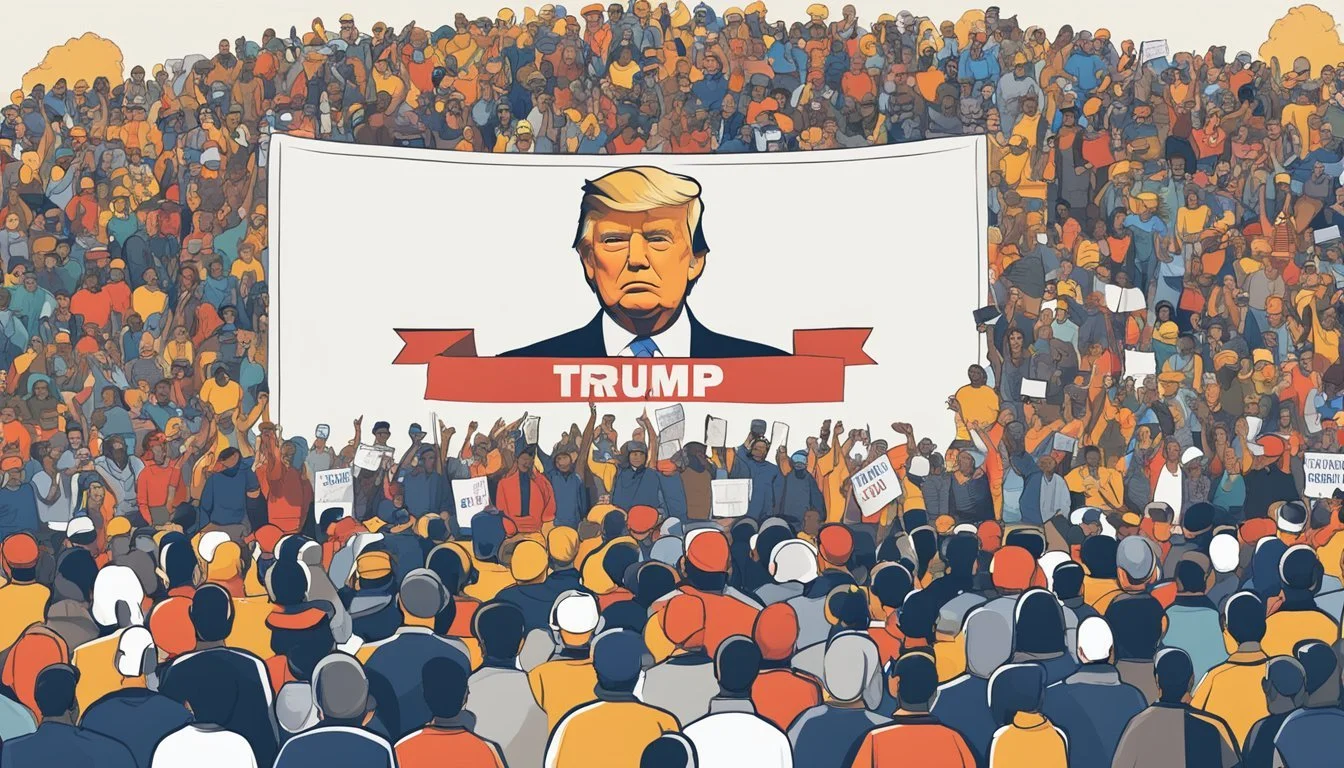Presidential Visit Spotlights Motor City Issues
Former President Addresses Auto Industry Concerns
Donald Trump's relationship with Detroit has been contentious during his political campaigns. The former president has repeatedly criticized Michigan's largest city while seeking votes in the state's suburbs. Trump's disparaging remarks about Detroit have become a recurring theme in his appeals to suburban voters in Michigan, a crucial swing state.
Trump's campaign strategy in Michigan involves contrasting suburban areas with Detroit, often portraying the city in a negative light. During a rally in Novi, a Detroit suburb, he continued this pattern of denigrating the city. This approach has drawn criticism from those who see it as divisive and potentially harmful to urban-suburban relations.
The former president's comments about Detroit have not been limited to suburban rallies. Even when speaking in the city itself, Trump has made critical remarks about Detroit's condition and leadership. These statements have sparked debates about the effectiveness and appropriateness of his campaign tactics in Michigan, a state that could play a pivotal role in the upcoming election.
Donald Trump's Influence in Detroit
Donald Trump's presence in Detroit has been marked by controversial statements and campaign strategies aimed at winning Michigan's crucial electoral votes. His rhetoric and policy proposals have sparked debate about their potential impact on the city's economy and political landscape.
Economic Impact and Policies
Trump's economic vision for Detroit centers on revitalizing the manufacturing sector, particularly the auto industry. He has proposed tariffs on imported vehicles and parts to protect American jobs. The former president's speeches at the Detroit Economic Club highlighted plans to renegotiate trade deals and reduce regulations to boost local businesses.
Trump's "Make Detroit Great Again" slogan resonates with some voters concerned about job losses. His criticism of globalist policies aligns with fears about outsourcing in the region. However, economists debate the long-term effects of these approaches on Detroit's economy and workforce.
Political Rallies and Campaign Strategies
Trump's campaign events in Detroit and surrounding areas draw large crowds of supporters. His rallies often feature promises to bring back manufacturing jobs and criticisms of Democratic leadership in the city. The former president's appearances in Wayne County aim to energize his base and sway undecided voters in this battleground state.
Trump's strategy includes appealing to blue-collar workers and emphasizing economic nationalism. His campaign targets Detroit suburbs, where he seeks to maintain and expand support. The 2024 election sees Trump continuing to position himself as an outsider fighting for the working class against established political interests.
Role in Michigan's Political Dynamics
Donald Trump's influence in Michigan extends beyond party lines, shaping the state's political landscape. He engages directly with local leaders and appeals to diverse voter groups, positioning himself as a key figure in Michigan's electoral calculus.
Bipartisan Voter Appeal
Trump's campaign strategy in Michigan targets a wide spectrum of voters. He courts traditional Republican supporters while also reaching out to blue-collar Democrats and independents. His focus on manufacturing jobs resonates in auto industry hubs. Trump's messaging on trade and economic policies aims to attract union members and workers concerned about job security.
The former president's approach has shown some success in flipping previously Democratic-leaning counties. However, he faces challenges in maintaining support among suburban voters, particularly women.
Engagement with Local Leadership
Trump actively cultivates relationships with Michigan's political figures. He seeks endorsements from state Republicans and engages with local officials to bolster his ground game. His team coordinates with county GOP chairs and grassroots organizations to mobilize supporters.
The candidate's interactions with Detroit's leadership have been mixed. While Mayor Mike Duggan remains a staunch Democrat, Trump attempts to appeal to city residents by criticizing Democratic policies. He targets Governor Gretchen Whitmer's record, framing her as an opponent to Michigan's economic interests.
Trump's campaign recognizes the importance of black voters in Detroit. They organize outreach events and highlight policies aimed at urban communities, though success in this demographic remains limited.
Elections and Voting Trends in Detroit
Detroit plays a crucial role in Michigan's electoral landscape. The city's voting patterns and campaign events significantly influence state and national election outcomes.
Campaign Incidents and Responses
Donald Trump held a rally in Warren, north of Detroit, as part of his 2024 campaign. During the event, he faced technical difficulties when his microphone cut out. A replacement was quickly provided, allowing him to continue addressing supporters.
In 2020, Trump supporters gathered outside Detroit's convention center as absentee ballots were counted. Some protesters held signs saying "stop the steal" and attempted to disrupt the process by beating on windows.
To prevent similar incidents in 2024, Detroit has increased security measures where ballots are counted. These steps aim to ensure a smooth and secure voting process.
Analysis of Previous Election Cycles
Michigan's electoral trends have shifted in recent years. Trump won the state in 2016, but Joe Biden secured it in 2020.
A recent poll shows Vice President Kamala Harris leading Trump by 3 points in Michigan. Voter preferences for ballot casting methods differ:
Harris voters: 39.1% absentee, 12.3% early voting, 46.5% Election Day
Trump voters: 21.1% absentee, majority on Election Day
Detroit's demographic changes impact voting patterns. The city's large African American population traditionally leans Democratic.
Early voting and absentee ballots are gaining popularity in Detroit. This trend may influence campaign strategies and election day turnout in 2024.
Economic Resurgence and Industrial Development
Detroit's economy has undergone significant changes in recent years. The city has faced challenges but also seen signs of revival, particularly in its signature auto industry and urban development efforts.
Auto Manufacturing and Jobs
Detroit's auto industry has experienced a resurgence. Major manufacturers have invested billions in modernizing plants and developing electric vehicles. This has created new manufacturing jobs and attracted suppliers to the region.
General Motors announced a $2.2 billion investment to produce electric trucks at its Detroit-Hamtramck plant. Ford committed $740 million to renovate Michigan Central Station as an innovation hub. These projects have boosted employment and economic activity.
The industry faces ongoing challenges from global competition and shifting consumer preferences. Some critics argue more needs to be done to secure long-term job growth and stability in the sector.
Federal Assistance and Urban Recovery
Federal aid has played a key role in Detroit's recovery efforts. The city received over $300 million in federal grants for blight removal and neighborhood revitalization after emerging from bankruptcy in 2014.
This funding helped demolish thousands of abandoned buildings and supported new affordable housing developments. Infrastructure improvements, including repairs to streetlights and roads, have made neighborhoods more livable.
Critics note persistent poverty and inequality despite these investments. Some areas still struggle with high unemployment and limited access to services. Ongoing debates center on balancing growth with equitable development across all parts of the city.
Social Issues and Public Perception
Detroit faces complex social challenges that shape public perception. The city grapples with crime concerns while working to revitalize its image through community initiatives and high-profile events.
Crime and Safety Regulations
Detroit has struggled with high crime rates for decades. In recent years, the city has implemented new law enforcement policies aimed at reducing violent crime. Community policing efforts focus on building trust between officers and residents. The city has also invested in technology like surveillance cameras and gunshot detection systems.
Despite these measures, crime remains a persistent issue. Some areas see improvement, while others continue to face safety challenges. Critics argue more resources are needed for crime prevention and youth programs. Supporters point to gradual progress in certain neighborhoods.
Influence on Cultural Events and Moments
Detroit hosts major events that boost its cultural profile. The NFL Draft came to the city in 2024, bringing national attention and economic benefits. Huntington Place convention center attracts conferences and expos year-round.
The North American International Auto Show remains a signature event. It showcases Detroit's automotive heritage while highlighting new technologies. Local music festivals celebrate the city's rich musical history.
These events provide positive media coverage and help reshape perceptions. They also create opportunities for community engagement and local business growth. However, some residents feel left out of high-profile happenings centered downtown.
Summary and Future Outlook
Donald Trump's recent campaign efforts in Detroit highlight the city's importance in the 2024 election. His visits and speeches aim to appeal to working-class voters and address key issues like the economy and jobs.
Trump's strategy involves criticizing current leadership and promising a "real comeback" for Detroit. He seeks to peel off support in traditionally Democratic areas while maintaining his base.
The former president faces challenges in a city that has historically leaned Democratic. However, his focus on economic concerns and manufacturing jobs could resonate with some voters.
Early voting has begun in Detroit, intensifying the campaign atmosphere. Both Trump and his opponents are increasing their presence in the area, recognizing Michigan's crucial role as a battleground state.
As the election approaches, Detroit's voting trends will be closely watched. The city's turnout and preferences could significantly impact the state's overall results.
Trump's energy and campaign style continue to energize his supporters. His ability to maintain this momentum through 2024 will be critical to his electoral chances in Detroit and Michigan as a whole.



